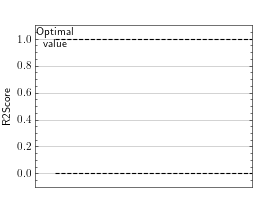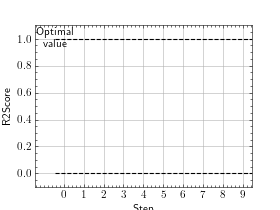R2 Score¶
Module Interface¶
- class torchmetrics.R2Score(adjusted=0, multioutput='uniform_average', **kwargs)[source]¶
Compute r2 score also known as R2 Score_Coefficient Determination.
\[R^2 = 1 - \frac{SS_{res}}{SS_{tot}}\]where \(SS_{res}=\sum_i (y_i - f(x_i))^2\) is the sum of residual squares, and \(SS_{tot}=\sum_i (y_i - \bar{y})^2\) is total sum of squares. Can also calculate adjusted r2 score given by
\[R^2_{adj} = 1 - \frac{(1-R^2)(n-1)}{n-k-1}\]where the parameter \(k\) (the number of independent regressors) should be provided as the adjusted argument. The score is only proper defined when \(SS_{tot}\neq 0\), which can happen for near constant targets. In this case a score of 0 is returned. By definition the score is bounded between \(-inf\) and 1.0, with 1.0 indicating perfect prediction, 0 indicating constant prediction and negative values indicating worse than constant prediction.
As input to
forwardandupdatethe metric accepts the following input:preds(Tensor): Predictions from model in float tensor with shape(N,)or(N, M)(multioutput)target(Tensor): Ground truth values in float tensor with shape(N,)or(N, M)(multioutput)
As output of
forwardandcomputethe metric returns the following output:r2score(Tensor): A tensor with the r2 score(s)
In the case of multioutput, as default the variances will be uniformly averaged over the additional dimensions. Please see argument
multioutputfor changing this behavior.- Parameters:
num_outputs¶ – Number of outputs in multioutput setting
adjusted¶ (
int) – number of independent regressors for calculating adjusted r2 score.Defines aggregation in the case of multiple output scores. Can be one of the following strings:
'raw_values'returns full set of scores'uniform_average'scores are uniformly averaged'variance_weighted'scores are weighted by their individual variances
kwargs¶ (
Any) – Additional keyword arguments, see Advanced metric settings for more info.
Warning
Argument
num_outputsinR2Scorehas been deprecated because it is no longer necessary and will be removed in v1.6.0 of TorchMetrics. The number of outputs is now automatically inferred from the shape of the input tensors.- Raises:
ValueError – If
adjustedparameter is not an integer larger or equal to 0.ValueError – If
multioutputis not one of"raw_values","uniform_average"or"variance_weighted".
- Example (single output):
>>> from torch import tensor >>> from torchmetrics.regression import R2Score >>> target = tensor([3, -0.5, 2, 7]) >>> preds = tensor([2.5, 0.0, 2, 8]) >>> r2score = R2Score() >>> r2score(preds, target) tensor(0.9486)
- Example (multioutput):
>>> from torch import tensor >>> from torchmetrics.regression import R2Score >>> target = tensor([[0.5, 1], [-1, 1], [7, -6]]) >>> preds = tensor([[0, 2], [-1, 2], [8, -5]]) >>> r2score = R2Score(multioutput='raw_values') >>> r2score(preds, target) tensor([0.9654, 0.9082])
- plot(val=None, ax=None)[source]¶
Plot a single or multiple values from the metric.
- Parameters:
val¶ (
Union[Tensor,Sequence[Tensor],None]) – Either a single result from calling metric.forward or metric.compute or a list of these results. If no value is provided, will automatically call metric.compute and plot that result.ax¶ (
Optional[Axes]) – An matplotlib axis object. If provided will add plot to that axis
- Return type:
- Returns:
Figure and Axes object
- Raises:
ModuleNotFoundError – If matplotlib is not installed
>>> from torch import randn >>> # Example plotting a single value >>> from torchmetrics.regression import R2Score >>> metric = R2Score() >>> metric.update(randn(10,), randn(10,)) >>> fig_, ax_ = metric.plot()

>>> from torch import randn >>> # Example plotting multiple values >>> from torchmetrics.regression import R2Score >>> metric = R2Score() >>> values = [] >>> for _ in range(10): ... values.append(metric(randn(10,), randn(10,))) >>> fig, ax = metric.plot(values)

Functional Interface¶
- torchmetrics.functional.r2_score(preds, target, adjusted=0, multioutput='uniform_average')[source]¶
Compute r2 score also known as R2 Score_Coefficient Determination.
\[R^2 = 1 - \frac{SS_{res}}{SS_{tot}}\]where \(SS_{res}=\sum_i (y_i - f(x_i))^2\) is the sum of residual squares, and \(SS_{tot}=\sum_i (y_i - \bar{y})^2\) is total sum of squares. Can also calculate adjusted r2 score given by
\[R^2_{adj} = 1 - \frac{(1-R^2)(n-1)}{n-k-1}\]where the parameter \(k\) (the number of independent regressors) should be provided as the
adjustedargument.- Parameters:
adjusted¶ (
int) – number of independent regressors for calculating adjusted r2 score.Defines aggregation in the case of multiple output scores. Can be one of the following strings:
'raw_values'returns full set of scores'uniform_average'scores are uniformly averaged'variance_weighted'scores are weighted by their individual variances
- Raises:
ValueError – If both
predsandtargetsare not1Dor2Dtensors.ValueError – If
len(preds)is less than2since at least2samples are needed to calculate r2 score.ValueError – If
multioutputis not one ofraw_values,uniform_averageorvariance_weighted.ValueError – If
adjustedis not anintegergreater than0.
- Return type:
Example
>>> from torchmetrics.functional.regression import r2_score >>> target = torch.tensor([3, -0.5, 2, 7]) >>> preds = torch.tensor([2.5, 0.0, 2, 8]) >>> r2_score(preds, target) tensor(0.9486)
>>> target = torch.tensor([[0.5, 1], [-1, 1], [7, -6]]) >>> preds = torch.tensor([[0, 2], [-1, 2], [8, -5]]) >>> r2_score(preds, target, multioutput='raw_values') tensor([0.9654, 0.9082])
